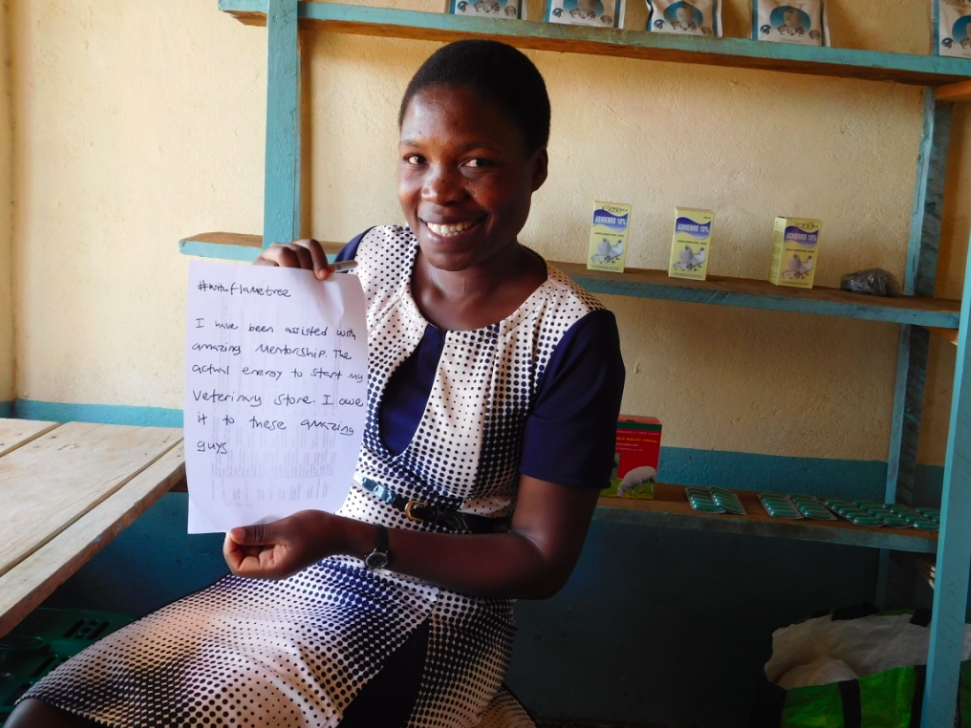Grace Phiri: Vet Science and Social Impact in Rural Malawi
Grace Phiri waves energetically as we finally pull up to her veterinary shop in Ntchisi. After a few twists and turns, driving down washboard, deeply rutted, and occasionally entirely broken Malawian backroads in the wrong direction, we have found the correct town, the correct street, and absolutely the correct woman. Her smile reminds us, though we need little reminding, what a powerful force she is.
Grace is one of the entrepreneurs in Cohort 3 of our Development Entrepreneurship Lab. She impressed us with her proposal for creating an agro-vet center, one which could supply local farmers, trained by the government to aid their neighbors, with the medications and vaccinations their animals need to remain healthy and strong. While her proposal was for a dream, six months later, we are able to witness her success.
The wind whips red dust around us, a sign that the droughts have gone on too long. The rainy season will need to compensate for this dry season as well as the last. Grace is not the only one to tell us that crop yields have been dramatically low. This, of course, also affects the livestock health, access to feed, and resulting reproduction of animal offspring.
Grace’s vibrant blue, orange, and yellow chitenje swishes suitably around her legs and I marvel, once again, that these women can go about their days with the tight skirt wrapped around their lower bodies. But Grace doesn’t walk, she practically skips to show us her small vet shop. The poise and determination she exemplified in the DELab has paid off; she now has her certificate from the Medicines and Poison Board of Malawi. I recall when she WhatsApped to tell me it had finally come in, just two months ago. Her shop has now been open a month. They had six customers on Monday, five on Tuesday, and three more on Friday. Each week there are more. Word is spreading.
Grace had written me before our arrival that her shop was very small, that she wanted to prepare us so that we wouldn’t “make fun” of her small size; but I responded immediately that there was no way that was possible.
“We like small starts,” Lauren reassures her. “It gives you room to expand intelligently, rather than investing too much of your time and energy in ways that may not succeed. It gives you space to learn from your failures.”
Grace’s intern, Steve, a recent graduate from LUANAR university, smiles in the Malawian way of warmth that is like a bashful sun breaching the shores of Lake Malawi, hugging us with cheerful eyes, saying, “You are most welcome.”
Steve is also well educated on the needs of the community but we would never doubt that Grace would choose an intern with incredible depth and potential. She has the mind of a businesswoman and a heart for the farmers in her region.
The shop, at about 10’ x 8’ may be small, but Grace’s exuberance spills out of the iron bars that separate her modest shop from customers outside. Her bright blue painted wooden shelves are stocked with antibiotics, vaccines, dewormers, and other pills and tags for animals. She explains that they mainly treat chickens and pigs, but there are some goats and cows as well.
When we ask the reason for such as small number of larger livestock, she explains how dairy cows, oxen and other large animals are often a burden on the families who keep them. The return on investment is pitifully low, starving out the farmer and draining his or her energy. We prod her further about the reasons why there are no small plows in the area, why farming has remained unchanged in Malawi for centuries. Instead, women bent-hinged from the waist, use hoes, often with babies on their backs, sparsely clad feet, and callouses on their hands. Why are there no tillers? Grace cannot give us an answer except that this is the way it has always been done.
“It is perhaps just our way. Just our mindset,” she says with a shrug. "Maybe it would just take one person to do it differently for others to see the benefits." We can see the wheels turning as she eyes the land outside her shop as a potential location to keep a plow horse.
Lauren asks about Grace’s social impact, one of the priorities we pressure our entrepreneurs to explore. It is necessary to have such assessments to attract impact investors, to report to donors, and to provide direction for business expansion. At this request, Grace promptly pulls a rolled sheet of paper from her purse, listing six different ways her agro-vet center can make true social and environmental impact in her community. They range from reduced livestock mortality to capacity building for Animal Health students. We have no doubt in her abilities to meet all of these goals and we will guide her in her measurement and analysis to ensure she has quality and professional data to present and to guide her strategy.
We sit on wooden stools, flanked by poured concrete walls, their vacant gray stares etched with the words of the literate, mainly names, some vocabulary words likely scrawled by kids, freshly learned at school. We are surrounded by tin sheets, broken pieces of wood furniture, cast aside partial bricks, and the occasional ant pile. She speaks of her potential and we confirm it. Highly educated and committed to her community, her smile and enthusiasm are matched by a calm poise and competency that we have come to love about Malawian women entrepreneurs. True grace and hope under pressure for her country’s need for progress.
Story by Angel Allendale
*For more stories about our entrepreneurs, read about Brown and Sungani's sustainable fuel company here.







